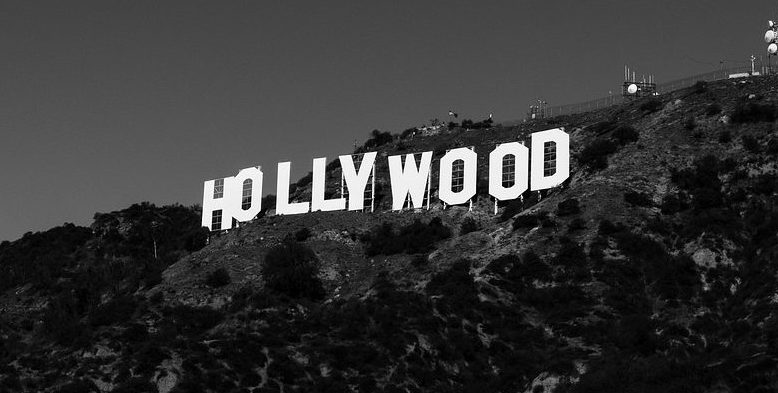Hollywood Haunted: Spirits, Specters and Eerie Encores
(Image by StockSnap from Pixabay)
HOLLYWOOD – In 1925, silent movie legend Lon Chaney Sr, shocked the world with his portrayal of a disfigured specter, in the Universal classic The Phantom of the Opera. So frightening was Chaney’s on-screen visage it is said audience members actually fainted during the unforgettable unmasking scene.
Chaney – who portrayed numerous tortured souls on screen – passed away in 1930 and is buried in an unmarked crypt in Forest Lawn Memorial Park. Perhaps this anonymity in repose is fitting, as many believe Chaney still haunts the Universal Studios lot – crossing creaking catwalks in a frantic dash between two worlds.
Peeking ever so tentatively behind the veil for a taste of Tinseltown terror, we spoke with Hollywood historian Laurie Jacobson – author (with Marc Wanamaker) of Hollywood Haunted: A Ghostly Tour of Filmland (1999 – Angel City Press). Jacobson is also the author of the recently released, TV Dinners: 40 Classic TV Kid Stars Dish Up Favorite Recipes With a Side of Memories (2020 – TV Classics Press.)
Jacobson makes her home in Santa Rosa, CA., with husband Jon Provost.
BPE: Thank you for taking some time to speak with us today. I trust you and Jon are well?
Laurie: I’m pretty good. You know we’ve been through a lot out here.
BPE: You’re probably close to those horrific fires, aren’t you?
Laurie: Yeah, we were. It got within 200 yards of us.
BPE: Oh my God!
Laurie: Yeah, it was, “Oh my god!” I’ll send you a picture that I took as we fled. There’s a large hill at the other end of our street, about seven houses down, and when we left, we could just see this huge orange glow coming over the hill. We saw flames at the top of the hill, and that’s when we drove away. I thought, you know, our luck had run out. But no! Those wonderful first responders came, and they saved virtually our entire neighborhood. Only one house was lost.
BPE: That’s super and a real blessing.
Laurie: Yes, I mean, it’s unbelievable, though now, we come to find that toxic ash has filled our house. So we’ve got to power wash the outside and pull all the insulation out of the attic. Our insurance guy happens to live in our neighborhood, and he called us and said, you need to take a look in your attic. We did and we almost fainted. It’s just completely gray with ash.

BPE: Sounds reminiscent of the Vesuvius eruption.
Laurie: Yeah, or Mount St. Helens. It’s a disruption, but you know, I still have a house to disrupt, and that’s the wonderful thing.
I was told that, with the one house that burned, the first responders knew they couldn’t save it, but that they had about 10 minutes before it was engulfed. So a group of them ran in and grabbed everything they could that looked like a family memento.
I’ve never even heard of that, and I just was simply wowed! These guys – they’re incredible. They’ve got heart and soul out there.
BPE: I’m really glad to hear that, Laurie. You know, one of the nice things about interviewing a comedienne is, I can open by asking you what kind of feed-back you’re getting on your recipe book?
Laurie: Ah! (laughter) That’s quite cute, Tony!
BPE: Thank You. I worked all night on that joke.
Laurie: Well the feed-back’s been great. You know, during this difficult time that we have been through, people have so enjoyed getting lost in TV Dinners and revisiting a much happier time in our lives. Visiting all those wonderful old shows that we grew up with, when people had empathy and cared about one another and did what was right and fair, and there was always a moral to every story. That’s where we learned how to make our way in the world, and the fact that these people they love are still out there. I mean we literally grew up with these child stars. That’s just been a joy for readers to return to.
BPE: Yes. One of those shows I’ve been watching lately is Car 54 Where Are You?
Laurie: I have a very vivid memory of watching that show with my parents. And we so enjoyed it, but you know those older comedians came up through vaudeville and radio and burlesque. People like Al Lewis and Joe E. Ross – their timing was perfection.
BPE: Are there any specific treats in TV Dinners our readers might want to try should they don their masks for a Halloween party?
Laurie: Oh, I can’t answer that one.
BPE: OK, we’ll just say your readers will have to buy the book and make up their own mind.
Laurie: That sounds good to me.
BPE: Hollywood Haunted: How did you get interested in the subject of Hollywood hauntings?
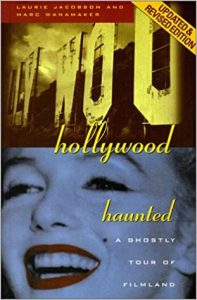
Laurie: Well, I started my career as a Hollywood historian, covering tragic, untimely deaths; murders that were still mysteries. People who died before their time. And there were always ghost stories attached to those stories. I used to file them away, as part of Hollywood’s lore. Then I actually experienced a ghost at Grauman’s Chinese Theater, and that is what sent me to my files. I thought, maybe there really is something to this stuff. So I called some psychics and parapsychologists, who were very well known in their field, and we started going to the places that had been reported to me as ghostly sites.
We had some remarkable experiences. And I was scared.
BPE: Please tell us that the ghost at Grauman’s wasn’t that of Sid Grauman, asking for your ticket?
Laurie: No. It was not Sid – it was some forlorn former employee named Fritz, who I later found out took his life in the theater. He has some attachment to the theater which he cannot let go of.
BPE: Were you interested in the paranormal before coming to Hollywood?
Laurie: You know, I always loved ghost stories as a kid, around the campfire, telling spooky stories. And I think I always believed that there were ghosts, although I never had any kind of experience as a child, other than to hear those stories. But I was always a believer. And so, when we started to go out together with these experts, and things actually happened, I discovered the more you look, you find there’s kind of a trick to it.
One of the psychics I worked with said the question is if they’re out there, why doesn’t everyone see them? And she said, it’s kind of like a radio frequency, where some people can tune into it and others cannot. There is also a deep belief that spirits feed off of our emotions. So people who do not believe in spirits don’t give them anything to work with. They have no fears, and fear is a very powerful emotion. So, if you’re afraid, spirits can pick up on the energy that you’re putting out with your fear or excitement, and more things are apt to happen to those people than to non believers.
BPE: So it’s like a ball that – once it gets rolling – it keeps on rolling?
Laurie: Yes… Yes.
BPE: The cover of your book features both the famous Hollywood sign and a photo of Marilyn Monroe. I assume there is a reason for those two selections?
Laurie: Yes. One of the things I did in the book was to create an arc while investigating these stories. There were always rumors that an actress named Peg Entwistle – who leaped from the Hollywood sign to her death, back in the 30s – still haunted the area around the Hollywood sign. We could not find anyone at any time, who ever saw or felt her spirit around that sign. So, that is one of the reasons the sign was there. Also, it’s a spooky looking picture, and this is Hollywood Haunted.
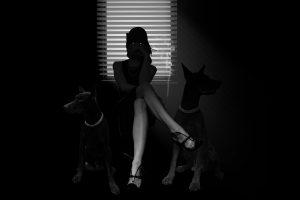
And Marilyn? You know, gosh, you’ve got the queen of Hollywood there. I do have two stories about her in the book.
Listen: what are ghosts? Ghosts, Spirits – they were at one time human beings, and their emotions run the gamut, that any human beings emotions run. So, when you have a pull of millions of people thinking about you every day. imagine the strength of that, and that is the fate of Marilyn Monroe. And I actually feel sorry for her about that, because sometimes she has been held earthbound, when she doesn’t particularly wish to be. So many people thinking of her; so many people go to her grave site on a daily basis.
And there is a very famous photo.
Someone took a picture of her crypt at the cemetery in Westwood, where she is buried, and she is seen in a corner of the picture, her face hovering above her crypt.
BPE: That’s fascinating!
Laurie: She also loved to stay at Hollywood’s most glamorous hotel – The Hollywood Roosevelt Hotel. She stayed there so often that she had a full-length antique mirror installed in her favorite suite. When she died, they removed the mirror, covered it up, and put it in the basement. Twenty-five years later, the hotel underwent a major renovation, and they found this mirror in the basement and had long since forgotten its history. They just thought it was a pretty mirror, and they installed it in the lower lobby.
The night of the grand reopening, as they were preparing for the crowds to come, a waitress was walking by the mirror, and she saw that it was dirty. She went over there to polish it, and as she’s rubbing the mirror, she saw a woman come up behind her, and look in the mirror. And she thought, “Does the lady need a question answered?” So she turned around, and there was no one there. She turned back to the mirror, and there was the blonde lady again. The waitress looked closely and it was Marilyn Monroe – looking in the mirror, fixing her makeup, fixing her hair, as she must have done hundreds of times before.
Now, there are two things I love about this story. One, the waitress didn’t have any information about the mirror or its history. She simply saw what she saw and hadn’t had any suggestions prior to that moment. It was just a pure sighting, which I love.
The second question is, was that a ghost? I don’t think it was a ghost. I think the mirror has been covered for 25 years, and the energy in that mirror had been held there while it was in storage. Now, suddenly it was being uncovered and released.
It’s why you’re never supposed to take an object from a tomb or an Indian burial ground. All objects carry energy of the person who owned it. Wasn’t it Kreskin who used to ask for an object, so he could read people’s feelings? You know, it’s the same thing. So I believe her energy was just trapped in one of her favorite objects. And I think that, over the years, that the mirror has hung in the Roosevelt, her energy has dissipated.

BPE: You once told me that longtime service employees, such as waiters, were a great source of Hollywood gossip. Is that also true when talking about Hollywood hauntings?
Laurie: Yes, because most spirits make their presence known when a place has quieted down. When there are a hundred people walking through the lobby of a hotel or a nightclub, we are less likely to experience some paranormal activity than late at night, when the waiters are cleaning up and there are just a few people in the room. That’s when you’re more apt to have an occurrence.
BPE: Of the stories you’ve investigated, how many are tied to the studios or a particular movie?
Laurie: There were lots of stories at the studios, and I found them quite romantic. Current security guards would see the spirits of older security guards still walking their beat; still protecting the studio. You know, back in the early days of Hollywood, a whole family might work at a studio. You worked there your whole life on some kind of crew, and maybe you met your wife in wardrobe or in the commissary. And when your kids were old enough, they came to work there too. It was a wonderful place to be, and studio heads were looked at as paternal figures. It just makes sense to me that these wonderful loyal employees would continue to protect the place that they loved.
People have seen women in costumes running from one set to the other, and they have witnessed things more ominous as well. You know, 300 pound lights suddenly swinging above your head. Things like that.
BPE: What about long-dead movie stars?
Laurie: Lon Chaney Sr, “The Man of a 1000 Faces” had an enormous soundstage built for his film, The Phantom of the Opera, because they needed a Paris Opera House set, and they had no buildings at Universal Studios that where that large. They stored the Opera House sets in that soundstage for decades after the film was made.
A lot of people claim Chaney is still in there.
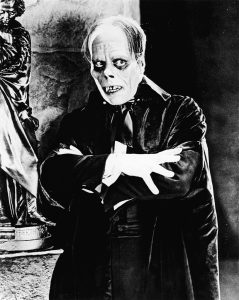
I mean, you’re talking about teamsters going in there in the 60s, the 70s, or the 80s, and seeing this caped figure running along the catwalks. These guys come out of there white as a sheet! Many people believed it was Lon Chaney up there. There’s really no other actor that can say, “Gosh, a entire soundstage was built just for the production of one of my films,” so that was pretty unique.
My other favorite story about him also reflects what happened in early Hollywood.
It used to be that actors and extras would catch a bus on the corner of Hollywood and Vine, and it would take you to the six major studios. If you didn’t find work that day as an extra at one of the studios, you got back on the bus and you went to the next one. And of course, that is how Lon Chaney – with his ability to change his appearance so easily – found work in the beginning.
There was a bus bench at the corner of Hollywood and Vine, and, after his death in 1930, people began seeing Lon Chaney’s ghost sitting at this bus bench. I mean so many people saw him that it was a front page story in the LA Times. And then they installed a plaque on the back of the bench that said, “Be careful where you’re sitting, you might be sitting on Lon Chaney.”
That lasted for decades, and then finally, they replaced the bench. After that, he was never seen there again.
BPE: Did Mae West live at The Roosevelt?
Laurie: No – I believe Mae lived at The Ravenswood. But one other frequent guest of the Roosevelt was Montgomery Clift, who worked with Marilyn in The Misfits.
Clift lived at the Roosevelt, when he was shooting From Here to Eternity. The hallway of the room that he stayed in was L shaped. He was in the bottom part of the L.
Clift used to walk up and down that short hallway practicing the bugle for his part in the film. Current residents of the hotel say that they feel someone walking shoulder to shoulder with them in that hallway. Some residents report that they hear somebody playing a bugle at midnight in the hotel. People have come from all over the world to stay in that room. You know, he wasn’t a happy guy.
BPE: I was just thinking about the fact that he and Marilyn were a pair of lost souls.
Laurie: You know, Clift was a gay man living in a straight man’s world. He had that horrible car accident in which he was disfigured. I think he self-medicated very heavily, with alcohol and pills.
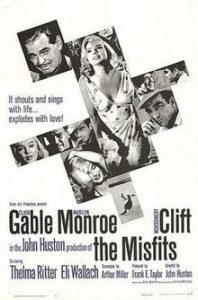
People have experienced him in his hotel room. Several say they have been shoved out of bed, or awakened to find a man sitting in a chair – staring at them. You know, they’ve brought film crews into that room, and in the middle of recording something, a radio will go on full blast. They’ll leave the room for five minutes and come back, and the temperature is suddenly boiling. He’s very disruptive and disrespectful. The only thing that hasn’t really been altered in that room is the bathroom, and I have felt intense sadness and despair in there.
BPE: Don’t some believe that the dysfunction on the set of The Misfits actually led to the death of Clark Gable?
Laurie: Yes. Marilyn was often late, and she was having a lot of trouble emotionally. I think her marriage was falling apart. To kill time, Clark Gable did some of his own stunts, which included lassoing wild horses and holding them down.
Though it sounds young to me now, Clark was in his early 60s, and it was really too much for him. Shortly after the film was completed, he had a heart attack and died, and many people blamed Marilyn.
BPE: What is the best documented apparition you have personally investigated?
Laurie: Well, I worked for a year as a cocktail waitress at The Comedy Store on the Sunset Strip. It used to be Ciro’s nightclub, which was the most glamorous nightclub in Hollywood’s Golden Age. In the 40s and 50s, you saw everyone there.
When a club is that popular and making that much money, the mob wants some of it.
Mickey Cohen was a mobster, and he was known as The King of the Sunset Strip. He had a clothing store a couple of blocks from Ciro’s, which was just a front for his nefarious business dealings. I was told by George Slaughter – who produced Laugh In and booked the talent at Ciro’s in the early 50s – that, on a weekly basis, Mickey would send a hat box over to Ciro’s with a note that basically said, “Fill this box with money, and send it back to my store,” which they did.
We saw a plethora of paranormal activity there.
There was a smaller club room upstairs. One night, one of the waitresses – as part of her job – went in there to put a tablecloth, a lit candle, and an ash tray on each table. She set the room, turned around for a moment, turned back, and everything was gone. The table cloths were folded and back on the shelf; the ash trays were stacked on the bar; the candles were blown out and put away. She went downstairs and called for some people to come upstairs because she was so afraid. She told them what happened, so they went upstairs, and the room was all set up again.
Ah-ha ~ little joke. When that room was locked, they heard people banging on the piano. They thought it was mice, but cats would not stay in that room. We saw men in pinstriped suits with wide collars walking through the offices all the time.
In the larger room they call the main room, one of the security guards saw that the lights were lit on the back of the stage, so he walked onto the stage to turn off the lights. When he turned around, 45 chairs were in a pile behind him. That happened in a matter of seconds, and he said he heard nothing.
He said he also saw stools move across that stage by themselves.
BPE: Very strange.
Laurie: Whatever spirits were there, they hated Sam Kinison’s act.
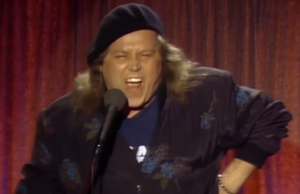
If you recall the comedian Sam Kinison, you’ll know he was a former Pentecostal preacher, who did a lot of screaming in his act. The spirits absolutely hated that. Sam is the only comic I know who was heckled from beyond the veil. And so, whenever he went on, you could hear moaning coming from the other room. “It’s him, ohhhhhhhh, it’s him.” If Sam was in that room, something would always go wrong. The lights went out; the microphone stopped working and wouldn’t come back on. The spirits tried to sabotage Sam’s act in every way they could.
One night, Sam shook his fist in the air and challenged them to, “Come and get me!” An ashtray was flung at his head.
So, these things are thinking, hearing, responsive spirits.
BPE: As opposed to unresponsive spirits?
Laurie: Some spirits don’t respond at all. It’s like a tape loop, where they just keep rebooting. Like on a Civil War battlefield, where something incredibly traumatic happened, and they’re just caught in this endless loop of violence or emotion. But there is something in the basement of the Comedy Store that is very dark and very scary. People have seen a blacker-than-black vague figure of a man that is seven feet tall, emerging from the basement on more than one occasion.
One afternoon, the owner of the club needed some supplies from the basement, but nobody wanted to go down there. She said, “Take a friend, but I need what I need.” So this security guard goes down there with two other guys, and one of the guys starts yelling, “No, no… stay away.” Now, the security guard, who had seen the black figure once before, didn’t see anything this time, but he grabbed his friend’s arm to run out of there. He said the friend’s hands were burning hot, as if they had been held against a stove. But all three men said they could see their breath in the room. As they were scrambling up the steps, a piece of cardboard fell out of the air and hit the main security guard on his hands. He picked up the cardboard and saw his name written on it.
That scared the living hell out of me. It knew who he was!
You know, I’ve encountered smells – old fashioned perfume that they don’t make any more. I’ve heard beautiful old fashioned music. I’ve had really pleasant experiences, but my feeling is, when they know your name, run like hell.
BPE: After you published Hollywood Haunted, did other stories come crawling out of the walls?
Laurie: Yes, and people started asking me to come to various places. I’ve seen some of the most beautiful mansions and the most squalid hotels. As a writer, that was fabulous. Of course, I had a couple of big, beefy parapsychologists with me – not that would have stopped anything – but I was always interested.
BPE: I’m guessing the beefy parapsychologists would have been good to have on hand, depending on what area of Los Angeles you were investigating.
Laurie: Truly. In one of those hotels, the guy who was giving us the tour told me that, when he moved in, he found a woman’s scalp in one of the drawers. That has stayed with me for my whole life.
BPE: I don’t want to go too far afield here, but knowing you and your connection to the child stars of classic television got me thinking of some untimely deaths the young actors had to deal with. Two, which immediately came to mind, were the passing of Joseph Kearns (Mr. Wilson) from Dennis the Menace and George Cleveland (Gramps) from Lassie. Have either Jon or Jay North mentioned feeling a presence on the set after their co-stars passed away?
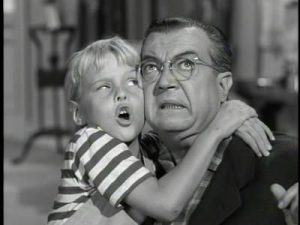
Laurie: Neither of those two guys reported any of that, and you know children often see spirits.
BPE: That’s why I asked, because both Jay and Jon were pretty young at the time.
Laurie: I did, however, investigate a former home of Joseph Kearns. He lived in a 100-year-old farm house, just north of Hollywood Blvd. I imagine that whole area was just farms and ranches when he lived there. The home housed an organ with pipes that went up three stories and were encased in the wall. There was a lot of paranormal activity in that house. The organ playing by itself and spirits seen on the property. You know, like Montgomery Clift, Joe was another repressed individual.
BPE: And given the times, he could have experienced a lot of emotional anguish?
Laurie: Sure.
BPE: What you’re describing with that house almost sounds like the plot of The Ghost and Mr. Chicken.
Laurie: I’m afraid I don’t know that film very well.
BPE: Oh, you must see it sometime. One of the other things I was doing on lockdown was watching Don Knotts movies.
Laurie: He was so funny. God, I loved him. And an amazing man. As a side story, I used to work with Suzanne Somers, and as you know Don was on Three’s Company. Suzanne told me that Don was nearly completely blind by that time, but he didn’t want anyone to know. So when he spoke his lines, he counted out his steps, like, “OK, it’s three steps to the couch, turn right, two steps to the front door,” and so forth. He couldn’t see, but he did what he needed to do to make it work. Just an amazing story.
BPE: I know our time is running short here, but please allow me to ask one final question: When Bullwinkle looked into the crystal ball and said, “The spirits are about to speak”, Rocky always asked, “Are they friendly spirits?” What is your final take on the ghosts of Hollywood? Are they mostly friendly spirits?
Laurie: I believe that the majority of spirits in Hollywood are friendly. Many are people who worked in the movie business, such as the old studio guards I mentioned earlier. And many of them are actors who loved being in front of an audience and continue making appearances today.
BPE: Like Clifton Webb?
Laurie: Clifton Webb is one of the few who saw a ghost, lived with a ghost and later, became a ghost. Why is he still haunting Hollywood? Because like most actors, he is afraid he’ll be forgotten.
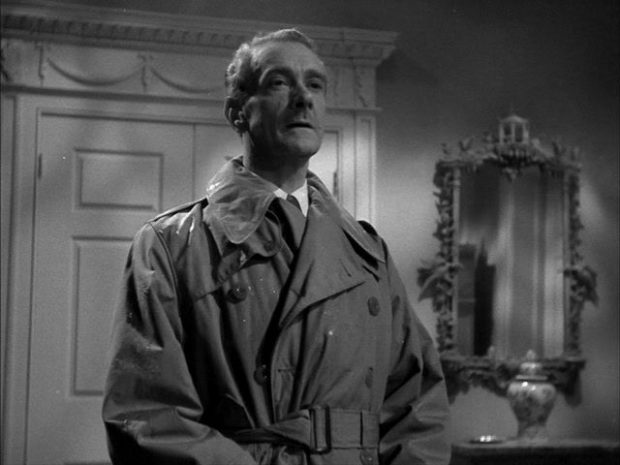
© Copyright 2020 Baltimore Post-Examiner. All Rights Reserved

Anthony C. Hayes is an actor, author, raconteur, rapscallion and bon vivant. A one-time newsboy for the Evening Sun and professional presence at the Washington Herald, Tony’s poetry, photography, humor, and prose have also been featured in Smile, Hon, You’re in Baltimore!, Destination Maryland, Magic Octopus Magazine, Los Angeles Post-Examiner, Voice of Baltimore, SmartCEO, Alvarez Fiction, and Tales of Blood and Roses. If you notice that his work has been purloined, please let him know. As the Good Book says, “Thou shalt not steal.”

